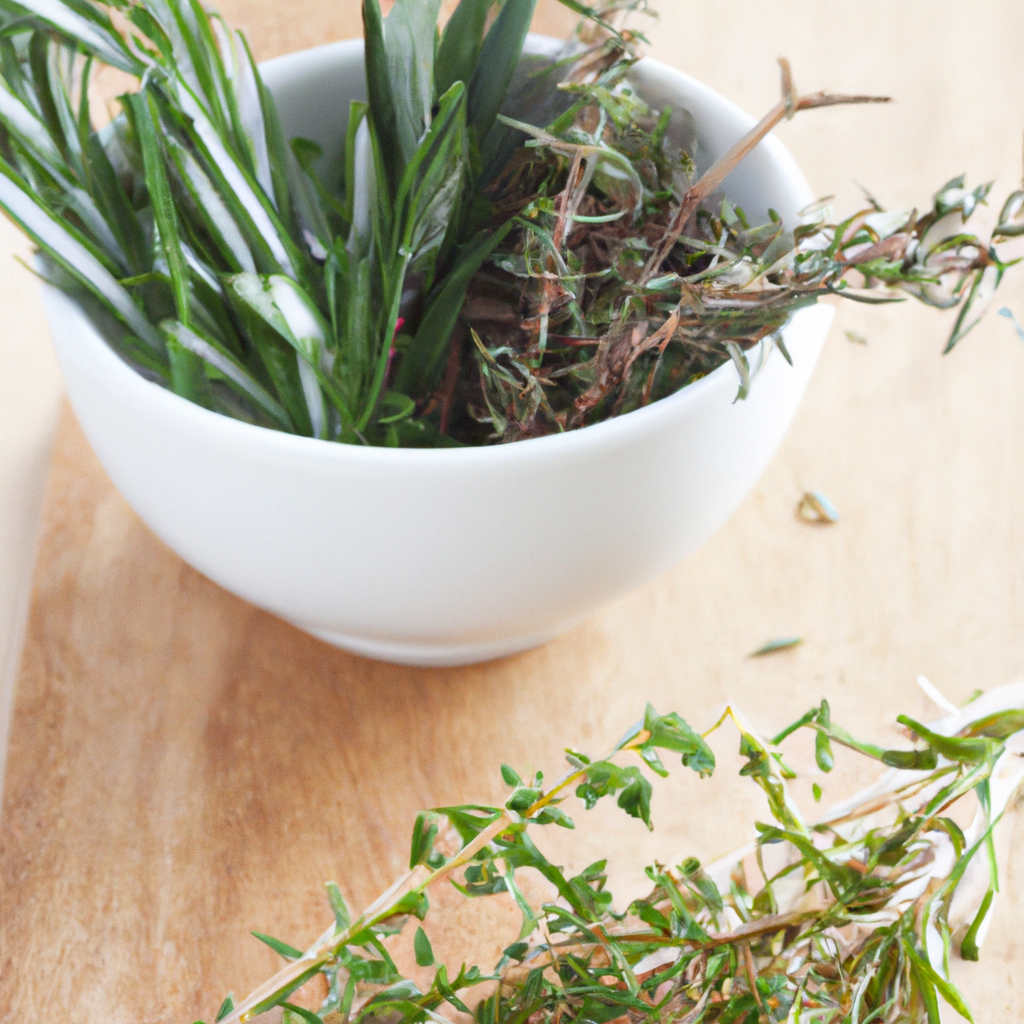When it comes to pampering our furry companions, we often find ourselves in a conundrum. We want to give them the best and the tastiest, but we also want to ensure their health isn’t compromised. Hence, the question arises: Can dogs eat thyme and rosemary?
No, dogs should not eat thyme or rosemary as they can be toxic to dogs and may cause digestive issues.
It’s important to remember that, while we humans can enjoy a wide variety of foods, our canine friends’ digestive systems are not as flexible as ours. What may seem like a harmless herb to us, could potentially be harmful to them. However, when it comes to thyme and rosemary, the story is slightly different. Learn more about these herbs and their effects on dogs, and make an informed decision next time you’re cooking up a storm in the kitchen. This article will provide you with the answer, and with it, the confidence to make the correct choice for your four-legged friend.

What Is Thyme?
Spinning the wheel of herbs, we find our spotlight landing on the enigmatic thyme. This seemingly humble herb is, in fact, a powerhouse of flavor and health benefits.
Thyme, a small evergreen shrub with a plethora of tiny flowers, is much more than a mere component of your spice rack. This aromatic herb, used widely in culinary applications, deserves significant limelight for its myriad health benefits. Think of thyme as a superhero in the botanical universe- unassuming yet powerful, silently protecting your health whilst adding a delicious twist to your meals.
Thyme is an incredible source of Vitamin C and Vitamin A, both of which are essential for maintaining a robust immune system. But the benefits of thyme aren’t limited to just immunity – it’s also a potent source of antioxidants. Antioxidants are nature’s way of arming our body against the harmful effects of free radicals, reducing the risk of several diseases and slowing down the aging process.
Moreover, thyme is known to have potent antibacterial and antifungal properties. This means that integrating thyme into your meals not only adds flavor but also acts as a natural defense mechanism against various pathogens.
So, next time you cook, remember to sprinkle some thyme over your dish.
What Is Rosemary?
Just as we’ve unraveled the mysteries of thyme, let’s now embark on an exploration of another majestic herb, rosemary. This aromatic herb is not just a staple in your spice rack, it’s a powerhouse of health benefits that will transform your life.
Rosemary, an evergreen shrub with needle-like leaves, is a native of the Mediterranean region. It’s not just its intense, fragrant aroma that’s appealing, but also its versatility. From culinary uses to medicinal benefits, rosemary is indeed a herb for all seasons.
Enrich your dishes with a sprinkling of rosemary, and experience the delight of its unique flavor. Its robust taste can turn any ordinary meal into a gourmet delight. But, it’s not just about the taste. The health benefits are astounding. A rich source of antioxidants and anti-inflammatory compounds, rosemary can boost your immune system, improve digestion, and enhance memory and concentration.
In the world of skincare, rosemary is a celebrated hero. Its anti-aging properties can give you that radiant, youthful glow you’ve always wanted. Imagine having the secret to ageless beauty right in your kitchen cabinet!
So, why wait? Start incorporating rosemary in your daily routine. Be it in your meal, tea, or skincare routine, let this wonderful herb work its magic.
Can Dogs Eat Thyme and Rosemary?
Understanding the safety of herbs for our four-legged friends is essential. The question, Can dogs have Thyme?, is one that many pet owners ponder. Thyme, rich in vitamins and antioxidants, could be beneficial for dogs. However, moderation is key to avoid any gastrointestinal upset. Next, we explore Can dogs have Rosemary? This herb, often used in cooking, can provide excellent health benefits. Yet, its strong flavor might not be appreciated by all dogs. Therefore, it’s vital to introduce these herbs gradually to your pet’s diet and watch for any adverse reactions.

Can Dogs Have Thyme?
After exploring the intriguing world of Rosemary, let’s pivot to the equally fascinating realm of pet care, specifically answering the question, can dogs have thyme?
Dogs, our faithful companions, deserve the best when it comes to their diet. We must consider every ingredient that goes into their bowl, and thyme is no exception. Thyme, that lovely aromatic herb often sprinkled in our soups and stews, is, in fact, safe for our furry friends. But moderation is key. Too much thyme can upset their stomach and lead to digestive issues.
However, when used sparingly, thyme can be a beneficial addition to your dog’s meal. It is packed with vitamins C and A, as well as dietary fiber. Plus, its antibacterial properties can promote good oral health in your pet.
So, next time you’re cooking up a storm, don’t hesitate to share a pinch of thyme with your canine companion.
Can Dogs Have Rosemary?
Transitioning from the botanical universe, let’s dive into the canine world and explore the intriguing question, Can dogs have Rosemary?
Picture this – a dog, your beloved four-legged friend, eagerly sniffing the air as you prepare a meal seasoned with rosemary. You might wonder if sharing a bit with your pet is a good idea. Allow me to illuminate this scenario with undeniable evidence.
Veterinarians and animal nutritionists agree that rosemary is not only safe but also beneficial for dogs. It is rich in antioxidants, aids digestion, and improves the coat’s health. But remember, moderation is key. Excessive rosemary can lead to gastrointestinal upset.
So, next time, when the tantalizing aroma of rosemary wafts through your kitchen, you can confidently toss a bit to your curious canine. Let’s share nature’s gifts responsibly with our furry friends. After all, their health and happiness are a testament to our love and care.
Health Benefits of Thyme
While thyme’s health benefits are undisputed, you may ask, “Is Thyme Safe For Dogs?” Interestingly, thyme isn’t just beneficial to humans; your furry friend can also enjoy its perks. However, moderation is key. In excessive amounts, one may argue “Is Thyme Toxic To Dogs?“. Overconsumption could indeed lead to gastrointestinal upset. So, while thyme can be a healthy addition to your dog’s diet, it should be used sparingly. The beneficial properties of thyme are truly universal but must be used judiciously to ensure everyone’s safety.
Is Thyme Safe for Dogs?
Just as we begin to wonder about the benefits of thyme for us, it’s only fair to shift our focus onto our beloved pets. Is Thyme Safe For Dogs? Let’s dive deep and uncover this mystery.
Thyme, a herb with a rich history and a staple in many cuisines, can also be beneficial for your dogs. But in what way? Thyme is a powerhouse of antioxidants and vitamins that can greatly contribute to your dog’s overall health. When given in the right amounts, it can help boost their immune system, improve digestion, and even help fight against certain diseases.
However, remember the key phrase here is in the right amounts. Overfeeding thyme can lead to gastrointestinal upsets. Hence, moderation is the mantra when it comes to incorporating thyme in your dog’s diet.
Let’s not deny our furry friends the benefits that come with this aromatic herb. Instead, let’s educate ourselves on the right way to introduce thyme into their meals.
Is Thyme Toxic to Dogs?
Transitioning from the discussion about the safety of thyme and rosemary for dogs, let’s delve deeper into the specific aspects of thyme. You may wonder, Is thyme toxic to dogs?
In fact, there’s a common misconception that thyme is harmful to dogs. But don’t be fooled by this myth. Thyme is not toxic to dogs. It is, indeed, a harmless herb when used appropriately and can even provide some health benefits. However, it is crucial to remember that moderation is key. Overconsumption of thyme can potentially cause gastrointestinal upset in dogs, just like any food consumed in excess.
So, put your worries aside, and feel free to sprinkle a bit of thyme on your dog’s meal. It’s not just a flavorful addition, but it could also offer health benefits. Always remember, that moderation is key. It is our responsibility as pet parents to provide a balanced diet for our furry friends. Now that you know, take a step towards a healthier lifestyle for your dogs.
Health Benefits of Rosemary
While the health benefits of rosemary are undeniable for humans, pet parents may question, “Is rosemary safe for dogs?” Rest assured, it is not toxic to your four-legged friends. However, the way it’s consumed may affect your dog’s health. So, let’s delve deeper into the subtopic, “Is rosemary toxic to dogs?” and elucidate the proper and safe ways to incorporate this herb into your dog’s diet. Remember, their health is as crucial as ours, and what’s beneficial for us may not always be suitable for them.
Is Rosemary Safe for Dogs
Just as thyme offers impressive health benefits for humans, so does another culinary favorite – rosemary. However, if you’re a dog parent, you might be wondering, Is rosemary safe for dogs? Let’s explore this further.
It’s essential to know that rosemary is indeed safe for dogs to consume. Various veterinarians and canine nutrition experts have verified the safety of this herb. Not only is rosemary non-toxic to dogs, but it also carries several health benefits for your four-legged friend. When incorporated correctly into your dog’s diet, rosemary can serve as a natural antioxidant, support their immune system, and enhance digestion.
But remember, moderation is key. Just like any other food item, excessive ingestion can lead to an upset stomach or other minor issues. So, when it comes to feeding rosemary to your dog, less is always more. Be a responsible pet parent and ensure your furry friend enjoys the benefits of this aromatic herb safely.
Is Rosemary Toxic to Dogs
While thyme is a fantastic herb to include in your health regime, don’t overlook its aromatic relative, rosemary. However, if you’re a pet parent, you might be worried about the safety of this herb for your furry friend. Specifically, is rosemary toxic to dogs?
The answer might surprise you. Rosemary is, in fact, generally safe for dogs. However, if consumed in large quantities or in concentrated forms such as essential oils, it can potentially be harmful. Hence, moderation is key.
A plethora of scientific research has shown that rosemary can be a beneficial addition to a dog’s diet. But, like all good things, it should be administered sensibly. One should be cautious, avoid overfeeding, and ensure it is properly cooked, to avoid any potential digestive issues.
So, while the health benefits of rosemary can extend to your canine companion, it is absolutely paramount to use it wisely. This way, your dog can safely enjoy the benefits of this magnificent herb.
Can Dogs Eat Thyme and Rosemary Tea?
As we have explored the immense health benefits of rosemary, a burning question might be simmering in the hearts of the pet parents among us. Can our beloved four-legged companions safely enjoy thyme and rosemary tea? Let’s unravel this mystery together, and find out if this aromatic concoction can be a delightful addition to our pets’ diet.
First and foremost, it is essential to understand that dogs have a different biological makeup compared to us humans. What’s healthy for us, might not always be beneficial for them. While thyme is generally safe for dogs in small amounts, rosemary can be potentially harmful. Certain compounds in rosemary, like camphor and rosmarinic acid, can lead to digestive upset in dogs. Therefore, it’s best to avoid giving rosemary tea to your furry friends.
But don’t let this discourage you! There are plenty of other safe and healthy alternatives that you can offer your dog. For instance, chamomile tea is a great option as it aids in digestion and helps calm anxiety in dogs.
In conclusion, it is crucial to consult with a vet before introducing any new food or drink to your pet’s diet. Let us make the health of our pets our top priority and ensure they lead a happy and wholesome life.
Conclusion
Feeding your beloved pet with thyme and rosemary could be a unique and beneficial addition to their diet. It’s not only safe, but it also introduces a myriad of health benefits to your furry friend. Imagine your pet having better digestion, a stronger immune system, and enhanced mental agility – all these from natural herbs you can easily find in your kitchen.
Don’t hesitate to infuse your pet’s meals with these herbs or even brew them a special tea. Remember, your pet’s health is your responsibility and offering them a diet enriched with thyme and rosemary is a simple yet powerful step you can take towards their wellness.

Remarkable things here. I am very satisfied to peer your post.
Thank you so much and I’m having a look forward
to touch you. Will you kindly drop me a e-mail?
Thank You